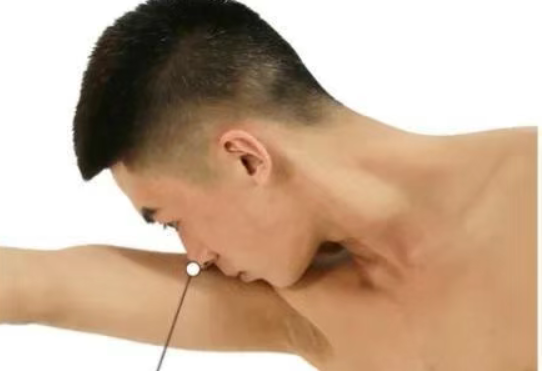Mainly Treated Disease
Epistaxis (Nasal Bleeding)
Mnemonic Verse
Epistaxis is related to multiple meridians.
If the bleeding doesn’t stop, dizziness and fainting will occur.
Needle Hegu, Fengfu, and Tianfu successively,
Then needle Yingxiang together with Shangxing.
Special Efficacy in Treatment
Epistaxis, nasal bleeding, nosebleed
Special Effective Acupoints
Hegu, Fengfu, Tianfu, Yingxiang, Shangxing
Introduction of Acupoints
Hegu: Located in the depression between the metacarpal bones of the thumb and the index finger of the hand.
Fengfu: Located one cun into the hairline at the back of the neck, one cun and five fen behind Naohu.

Tianfu: Located three cun below the armpit, five cun above the elbow and wrist, at the point where the tip of the nose touches when the arm is bent.
Yingxiang: Located one cun and five fen below the eye, five fen outside the nasal cavity.
Shangxing: Located one cun straight into the hairline above the tip of the nose.
Analysis of Etiology and Pathology
[Analysis 1]: According to “The Golden Mirror”, note: Epistaxis from spring to summer belongs to the Taiyang Meridian, and epistaxis from autumn to winter belongs to the Yangming Meridian. Epistaxis is caused by the injury of the yang collaterals, and rectal bleeding is caused by the injury of the yin collaterals. The Taiyang Meridian dominates the exterior of the body, and spring and summer are related to the exterior. Therefore, epistaxis from spring to summer belongs to the Taiyang Meridian. The Yangming Meridian dominates the interior of the body, and autumn and winter are related to the interior. Therefore, epistaxis from autumn to winter belongs to the Yangming Meridian. Epistaxis occurs from the nose. The Hand Taiyang Meridian goes up to the area beside the nose (the cheek area). The Foot Taiyang Meridian enters the brain from the vertex and connects with it. The nose is connected to the brain. The Hand Yangming Meridian runs beside the nostrils, and the Foot Yangming Meridian starts from the intersection of the nose and the forehead. All these four meridians pass through the nasal area, so they can all cause epistaxis. The Taiyang Meridian runs on the surface of the body. As the classic says: The Taiyang Meridian is related to the opening. In spring and summer, the yang qi is on the exterior, which has the meaning of opening. So epistaxis in spring and summer belongs to the Taiyang Meridian. The Yangming Meridian runs inside the body. As the classic says: The Yangming Meridian is related to the closing. In autumn and winter, the yang qi is inside, which has the meaning of storing. So epistaxis in autumn and winter belongs to the Yangming Meridian. You Yi said: The Shaoyang Meridian does not enter the nose and forehead area, so it is not related to epistaxis.
Medical Cases
[Case 1]: Mr. Xiang, 50 years old, from Guangrao County, Shandong Province, lived in Lane 58, Hejiang Street, Taipei City, Taiwan Province. In the autumn of the 44th year of the Republic of China, he suddenly suffered from continuous nasal bleeding that didn’t stop throughout the night. The amount of blood that flowed out was as much as a washbasin. Mr. Tian, a fellow villager who lived in the same courtyard with him, saw that his condition was serious. At about 4 o’clock in the morning, when it was pouring with rain, he invited me to go and treat him. When I arrived at his home, I saw that he was in a coma and unconscious. The nasal bleeding was still going on, and he didn’t respond when called. I immediately needled “Hegu, Tianfu, Fengfu, Yingxiang, Shangxing”, and soon the bleeding stopped and he recovered.
[Case 2]: Mr. Li, 18 years old, from Shandong Province, lived on Andong Street, Taipei City. On the morning of December 1, the 57th year of the Republic of China, he suddenly suffered from nasal bleeding. The bleeding stopped and started again, and it didn’t stop throughout the day, resulting in dizziness and a pale face. At about 12 o’clock at night on that day, he came to our clinic and knocked on the door for treatment. I immediately needled the above acupoints, and he was cured.
Addition by the Working Group
[Explanation of Traditional Chinese Medicine Disease Name]: Nǜ (pronounced nǜ, ㄋㄩˋ in Chinese phonetic notation): ‘ 衄 ‘ and ‘ 衂 ‘ are variant characters with the same meaning, both referring to bleeding from the nostrils, that is, nosebleed. The phonetic notation ㄋㄧㄡˋ entered on the computer is the wrong pronunciation.
